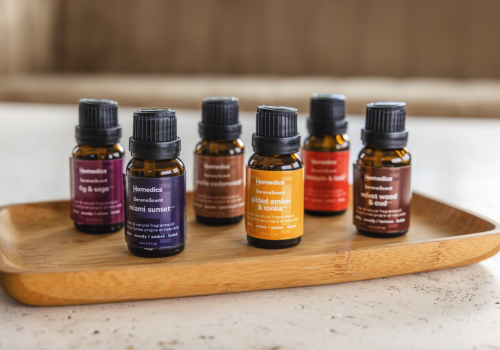11 Simple and Quick Ways to Destress
Work duties, personal responsibilities, unexpected challenges—these can all cause stress to build up until you feel overwhelmed and unable to focus.
High levels of stress aren’t healthy, but it can be difficult to overcome when it’s occupying your mind. Learn how to destress with 11 quick and simple tips.
Signs You’re Feeling Stressed
Stress is part of your body’s natural response to perceived threats. Unfortunately, it’s all too easy to feel stressed about situations that don’t warrant it. Or you might feel so much stress about something that it’s difficult to prepare properly for it.
In these cases, your body releases stress hormones unnecessarily, which can be disruptive to your ability to concentrate.
What Happens to Your Body When You’re Stressed?
Common symptoms of stress include:
- Headaches
- Chest pain
- Muscle tension
- Stomach nausea or irritation
- High blood pressure
- Elevated heart rate
- Mood swings
- Panic attacks
Stress management is an important part of taking care of your mental health. It’s also vital for your physical well-being.
When you’re feeling stressed, your healthy diet might become at risk of lapsing and you could find yourself suddenly increasing the risk factors for high blood pressure.
For example, stress sometimes makes it difficult to be physically active. When you’re feeling overwhelmed, tired, or anxious, you might not feel the motivation to exercise or even take a walk. Stress can have negative effects on your overall lifestyle that could add up to become significant challenges.
How to Destress Using Simple and Quick Tips
One survey showed that as many as 83 percent of U.S. workers suffer from work-related stress, and that’s not accounting for all the personal responsibilities that can build up to create overwhelming stress in people’s daily lives.
Stress affects many parts of your life, from your ability to focus on work to your appetite and sleep schedule. Chronic stress can manifest in physical ways, while even temporary stress can lead to poor focus, mood swings, and feelings of sadness.
If you’re feeling stressed, try these tips to promote relaxation and help relieve stress.
1. Deep Breathing
Deep breathing is a great practice you can do just about anywhere and may help you quickly destress. It takes no equipment and no prior planning, so it can also be a quick escape from high-stress situations.
Deep breathing—or abdominal breathing—forces you to focus on your breathing, your body, and what you’re feeling. It makes you consider the present moment and could help push stressful thoughts out of your mind.
Research shows that deep breathing may have positive effects on a person’s mood and stress level.
To do a simple deep breathing session:
- Find a comfortable position either lying on your back or sitting.
- Take in a deep breath through your nose and feel it expand your stomach.
- Then, breathe out through your mouth, pushing all of the air out of your belly.
- Repeat the process slowly, as many as 10 times or more.
Other deep breathing routines exist, including 4–7–8 breathing and roll breathing. Explore these different mindfulness exercises to find the one that works best for you and try incorporating it into your daily routine.
2. Progressive Muscle Relaxation
Stress may cause you to feel uncomfortably tense, just as it makes it difficult to focus your thoughts.
Progressive muscle relaxation has a similar goal as deep breathing: to help relieve stress by slowly focusing your mind on the tightness you’re feeling and relieving that tension. This mind and body practice involves tensing one specific muscle group at a time while inhaling, and then relaxing the muscles as you exhale.
It’s a slow, deliberate exercise that can help promote relaxation and calmness.
You should perform progressive muscle relaxation somewhere quiet, where other people and sounds won’t disturb you. Make yourself comfortable so that you can spend 10–20 minutes relaxing your muscles.
Typically, progressive muscle relaxation routines start with the forehead. Guided instructions are available from many audio and video sources that can help you learn the process and become familiar with the rhythm during your first few sessions.
You’ll start at the top of your body, tensing your forehead muscles and inhaling slowly. Then, relax your forehead and exhale fully. Moving downward, you’ll repeat these simple steps with each muscle group in your face, torso, arms, and lower body.
Both deep breathing and progressive muscle relaxation may promote calmness as part of a bedtime routine.
3. Take a Walk
Walking offers so many benefits, both physical and mental. When you’re feeling stressed and can’t focus, you might be tempted to sit still and continue trying to focus on the task at hand.
But if you’re still struggling to be productive, try taking a short walk to activate your muscles and enjoy the change of scenery.
Whether you take a walk around the block or just go for a stroll from your desk to the bathroom, stretching your legs and forcing yourself to notice the world around you can be a helpful way to refocus and move your thoughts away from stress.
If you can, go outside and soak up some sun. For some people, hiking on trails or in the forest feels rejuvenating after spending too much time working indoors or worrying.
Of course, a walk also brings all of the benefits exercise can have for your stress management goal, too.
4. Do Some Exercise
As a key part of a healthy lifestyle, exercise has numerous benefits that can help combat stress. On one hand, being physically active has major effects on your overall well-being. But it’s also a great way to “work off” stressful thoughts and stress-related tension.
You don’t need to work out at a full gym to feel the benefits of exercise, either. A few sets of jumping jacks, push-ups, or crunches can increase your heart rate and help stimulate your brain.
Many people find yoga a more relaxing, stress-reducing form of exercise than traditional strength training or high-intensity aerobic exercise. Research shows that yoga may help relieve side effects of general stress and anxiety.
5. Turn Off the Screens
While research has not concluded whether or not social media and screen time have direct effects on people’s stress levels, there is some evidence that certain people may feel more stress when they see others’ stress on social media. Ultimately, it may come down to individual experiences.
If you believe screen time and especially social media have a negative influence on your stress levels, try to limit your usage.
6. Listen to Music
Research shows that listening to music may help promote relaxation when you’re feeling stressed. Everyone has their own music preferences, so when you want to quickly destress, put on your favorites to relax the mind.
7. Have a Healthy Snack
When you feel overwhelmed by stressful thoughts, a favorite healthy snack may help boost your mood and take your mind off of what’s worrying you.
One study found that chewing gum is helpful for reducing distractions and helping you focus your thoughts.
Since stress can often be the result of outside events weighing on your mind, chewing gum may be a way to help focus on your work or an activity instead of the stressful thoughts.
8. Talk to a Friend
When your mind is stuck on stressful thoughts, or you feel like you can’t stop worrying about some upcoming deadline, try talking to a trusted friend about it.
You don’t have to ask for advice or help. Just speaking to someone familiar can help distract you from the stress. Friends might also help you see things from a different perspective—one in which that task or responsibility doesn’t sound so impossible.
9. Enjoy a Bath
A warm bath or massaging foot bath may help promote relaxation. Make a foot bath part of your bedtime routine to soothe your tired feet and help yourself wind down after a long, stressful day.
10. Give Yourself a Massage
Massages are meant to be relaxing experiences, but the effort that goes into scheduling a massage might just add to your stress. Fortunately, you can use a massage pillow or vibrating foam roller at home to help relax your mind and promote stress relief.
11. Meditate or Practice Mindfulness
Meditation comes in many forms, but this simple practice of focus and calmness may help relieve some of the effects of stress. Guided mediation may be valuable for beginners. Fortunately, guided meditation is widely available in online videos and apps.
Mindfulness and visualization techniques are meant to help you focus on specific thoughts, scenes, or feelings. Doing these exercises may also promote relaxation and help push stressful thoughts out of your mind.
Destress to Help Yourself Focus
Stress relief becomes an important part of your physical and mental health care when you start to feel overwhelmed or exhausted by stress.
With these tips on how to destress, you can start building stress relief habits to help you avoid the negative effects of stress in the future.
Medical Disclaimer: This content is provided for informational purposes only and not intended to be a substitute for professional medical advice, diagnosis or treatment.
Sources
Stress, Cleveland Clinic: https://my.clevelandclinic.org/health/articles/11874-stress
Know Your Risk Factors for High Blood Pressure, American Heart Association: https://www.heart.org/en/health-topics/high-blood-pressure/why-high-blood-pressure-is-a-silent-killer/know-your-risk-factors-for-high-blood-pressure
42 Worrying Workplace Stress Statistics, The American Institute of Stress: https://www.stress.org/42-worrying-workplace-stress-statistics
5 Surprising Benefits of Walking, Harvard Medical School: https://www.health.harvard.edu/staying-healthy/5-surprising-benefits-of-walking
Exercise: 7 Benefits of Regular Physical Activity, Mayo Clinic: https://www.mayoclinic.org/healthy-lifestyle/fitness/in-depth/exercise/art-20048389
Depression and Anxiety Disorders: Benefits of Exercise, Yoga, and Meditation, NCBI: https://pubmed.ncbi.nlm.nih.gov/31083878/
Social Media and the Cost of Caring, Pew Research Center: https://www.pewresearch.org/internet/2015/01/15/social-media-and-stress/
Music Listening as a Means of Stress Reduction in Daily Life, NCBI: https://pubmed.ncbi.nlm.nih.gov/26142566/
Chewing Gum: Cognitive Performance, Mood, Well-Being, and Associated Physiology, BioMed Research International: https://www.hindawi.com/journals/bmri/2015/654806/





